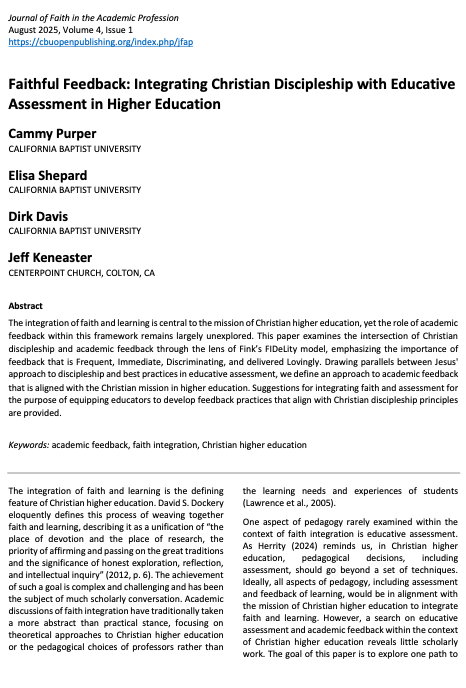Faithful Feedback: Integrating Christian Discipleship with Educative Assessment in Higher Education
Abstract
The integration of faith and learning is central to the mission of Christian higher education, yet the role of academic feedback within this framework remains largely unexplored. This paper examines the intersection of Christian discipleship and academic feedback through the lens of Fink’s FIDeLity model, emphasizing the importance of feedback that is Frequent, Immediate, Discriminating, and delivered Lovingly. Drawing parallels between Jesus' approach to discipleship and best practices in educative assessment, we argue that academic feedback can serve as a formative tool for both intellectual and spiritual growth. By fostering student engagement, self-reflection, and continuous learning, faith-informed feedback practices can enhance academic outcomes while embodying the mission of Christian education. This study offers suggestions for integrating faith and assessment for the purpose of equipping educators to cultivate transformative learning experiences that align with Christian discipleship principles.
References
Boud, D., and Molloy, E. (2013). Rethinking models of feedback for learning: The challenge of design. Assessment & Evaluation in Higher Education, 38(6), 698–712.
Boud, D., & Soler, R. (2016). Sustainable assessment revisited. Assessment & Evaluation in Higher Education, 41(3), 400-413.
Carey, P., Milsom, C., Brooman, S., & Jubb, E. (2017). Student views of assessment and feedback. Innovations in Practice, 2, 123–131.
Carless, D. (2006). Differing perceptions in the feedback process. Studies in Higher Education, 31(2), 219-233.
Carless, D., & Boud, D. (2018). The development of student feedback literacy: Enabling uptake of feedback. Assessment & Evaluation in Higher Education, 43(8), 1315-1325.
Dawson, P., Henderson, M., Mahoney, P., Phillips, M., Ryan, T., Boud, D., & Molloy, E. (2018). What makes for effective feedback: Staff and student perspectives. Assessment and Evaluation in Higher Education, 1–12.
Dockery, D. S. (Ed.). (2012). Faith and learning: A handbook for Christian higher education. B & H Publishing Group.
Epstein, M. L., Epstein, B. B., Brosvic, G. M. (2001). Immediate feedback during academic testing. Psychological Reports, 88(3), 889-894. https://doi.org/10.2466/pr0.2001.88.3.889
Evans, C. (2013). Making sense of assessment feedback in higher education. Review of Educational Research, 83(1), 70-120. https://doi.org/10.3102/0034654312474350
Fink, L. (2003). Creating significant learning experiences: An integrated approach to designing college courses. Jossey-Bass.
Gaynor, J. W. (2020). Peer review in the classroom: Student perceptions, peer feedback quality and the role of assessment. Assessment & Evaluation in Higher Education, 45(5), 758–775.
Guthrie, E. R. (1935). The psychology of learning. New York: Harper
Hattie, J., & Timperley, H. (2007). The power of feedback. Review of Educational Research, 77(1), 81-112.
Herrity, A. (2024). Teaching Christianly. Journal of Faith in the Academic Profession, 3(1).
Jonsson, A. (2013). Facilitating productive use of feedback in higher education. Active Learning in Higher Education, 14(1), 63–76. https://doi.org/10.1177/1469787412467125
Lawrence, T.A., Burton, L.D., & Nwosu, C.C. (2005). Refocusing on the learning in the “integration of faith and learning”. Journal of Research on Christian Education, 14(1), 17-50.
Mangum, D., Brown, D.R., Klippenstein, R., & Hurst, R. (2014). Lexham Theological Wordbook. Lexham Press.
Maurer, T. W., & Kropp, J. J. (2015). The impact of the Immediate Feedback Assessment technique on course evaluations. Teaching & Learning Inquiry, 3(1), p. 31–46.
Morris, R., Perry, T., & Wardle, L. (2021). Formative assessment and feedback for learning in higher education: A systematic review. Review of Education, 9(3), 1-26. https://doi.org/10.1002/rev3.3292
Paterson, C., Paterson, N., Jackson, W., & Work, F. (2020). What are students’ needs and preferences for academic feedback in higher education? A systematic review. Nurse Education Today, 85. https://doi.org/10.1016/j.nedt.2019.104236
Speckesser, S., Runge, J., Foliano, F., Bursnall, M., Hudson-Sharp, N., Rolfe, H., & Anders, J. (2018). Embedding Formative Assessment Evaluation report and executive summary. Education Endowment Foundation. https://dera.ioe.ac.uk/id/eprint/32012/1/EFA_evaluation_report.pdf
Van der Schaaf, M., Baartman, L., Prins, F., Oosterbaan, A., & Schaap, H. (2013). Feedback dialogues that stimulate students' reflective thinking. Scandinavian Journal of Educational Research, 57(3), 227–245.
Wiggins, G. (1988). Educative assessment: Designing assessment to inform and improve student performance. Jossey-Bass.
Wiliam, D. (2018). Feedback: At the heart of – but definitely not all of – formative assessment. In A. Lipnevic, & J. Smith (Eds.), The Cambridge handbook of instructional feedback (pp. 3–28). Cambridge, UK, Cambridge University Press.

Downloads
Published
Issue
Section
License
Copyright (c) 2025 Cammy Purper, Dirk Davis, Elisa Shepard, Jeff Keneaster (Author)

This work is licensed under a Creative Commons Attribution-NonCommercial-NoDerivatives 4.0 International License.


